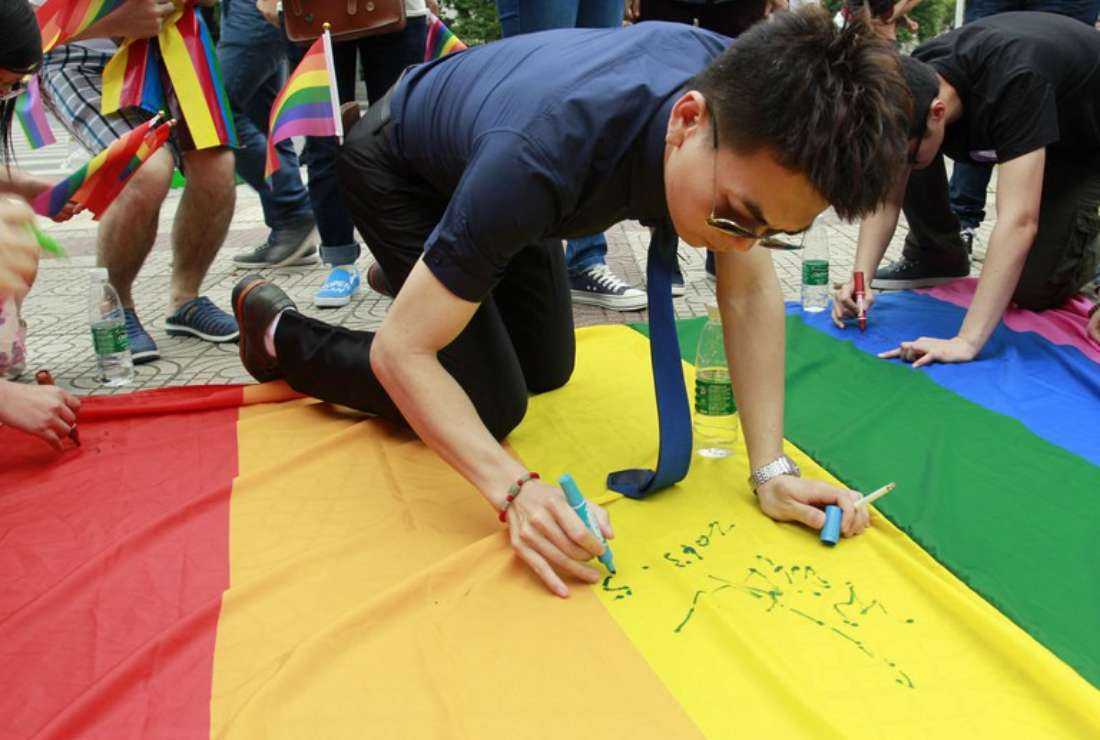
Since 2018, LGBTQ communities have been facing rampant crackdown in China, activists say

A man signs a rainbow flag during an anti-discrimination march in Changsha, China, in 2013. The ruling Chinese Communist Party currently regards LGBTQ+ rights activists as being influenced by "hostile foreign forces'' seeking to undermine its rule. (Photo: AFP)
Two female Chinese students who promote LGBTQ rights have continued a legal battle seeking a review of punishment and harassment for placing rainbow flags on a university campus, says a report.
The pair, identified only as Huang and Li, are students of Tsinghua University in the Chinese capital Beijing. They reportedly placed 10 small pride flags on the university supermarket table in May last year as part of a campaign against homophobia, Radio Free Asia reported on April 1.
They also left a note: "Please take one #PRIDE."
Huang and Li had not shared the details online or on any public platforms, however, the act was caught by security cameras.
Within two hours, they allegedly received calls from university officials who asked them to explain the act and warned it could affect their chances of graduating and threatened them with possible expulsion.
As they refused to apologize and meet the officials, they were accused of "distributing prohibited propaganda material."
By June 30, the pair received a notification for punishment, and they submitted a written response to the student affairs office by saying they did not distribute the flags and that promoting pride flags is not illegal.
In July, they were issued a "severe warning," which would remain on their official file and affect their chances of pursuing scholarships, further study, or jobs working for the government.
On Feb. 20, they filed a petition with the education ministry seeking review and withdrawal of the punishment.
Huang feels that the retaliatory actions against them have made the notion of same-sex relations embarrassing and called on the need for more advocacy on the matter.
"It's a matter of our reputation. By punishing us, the school made a lot of people feel that we did something disgraceful,” Huang said.
"We also want to do some public advocacy on this matter and start a public discussion about sexual minorities in universities," she further added.
LGBTQ activist Peng Yanhui voiced his lack of optimism about the successful outcome of the lawsuit.
"Maybe if it was a few years ago, you could file a lawsuit like that, but now, I'm not so sure," Yanhui said.
"Before 2018, cases linked to LGBTQ+ rights could at least get some kind of procedural justice, and spark public debate,” he further added.
"But it's still very encouraging. At least schools may not move so quickly to issue punishments when dealing with similar incidents in the future,” he pointed out.
Despite the constant fear of possible retaliation from the authorities, Li feels that the case is her unique stand against the discrimination and suppression of her sexual orientation.
"For me, this is a political declaration, and I have to take it all the way, or I wouldn't be able to live with myself," said Li.
"We have to take the legal process all the way, so that this winds up in the legal archives, in the media, and online archives. I believe that history will eventually judge us fairly,” Li further added.
Huang and Li made the details of their ordeal public in July 2022 on the WeChat social media platform and were removed by the government censors after it gained more than 100,000 views.
The ruling Chinese Communist Party associates same-sex relations and partnerships as propaganda promoted by "hostile foreign forces” to undermine its rule in China.
Reportedly, pride marches and any expression of same-sex ideas are suppressed by authorities and Chinese institutions still engage in “conversion therapy,” an outdated and abusive practice condemned worldwide.
Activist Wu Feiming pointed out that the suppression of LGBTQ communities is rampant in China by the authorities.
"By 2018 and 2019, a lot of college LGBTQ+ associations were being targeted by school Communist Party Youth League and Communist Party committees for interviews and other kinds of pressure," Feiming said.
"They began to be closely monitored," said Feiming adding that “by 2019, 2020, a lot of college associations had been canceled, moved underground, or were lying dormant.”
The suppression of the LGBTQ community is rampant online with a large censoring army engaged in continuous monitoring of content.
In 2021, the social media platform WeChat deleted dozens of accounts belonging to university LGBTQ groups, which activists pointed out as evidence of a "changing climate" for LGBTQ groups.
Li Boran, another LGBTQ activist claimed societal acceptance of LGBTQ has increased while its official acceptance has decreased.
Media reports say many LGBTQ organizations have changed their names to avoid constant harassment from the authorities.
Help us keep UCA News independent
The Church in Asia needs objective and independent journalism to speak the truth about the Church and the state.
With a network of professionally qualified journalists and editors across Asia, UCA News is just about meeting that need. But professionalism does not come cheap. We depend on you, our readers, to help maintain our independence and seek that truth.
A small donation of US$2 a month would make a big difference in our quest to achieve our goal.

Share your comments